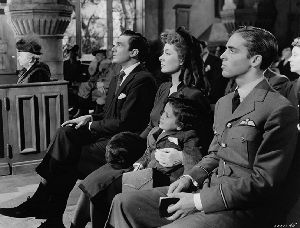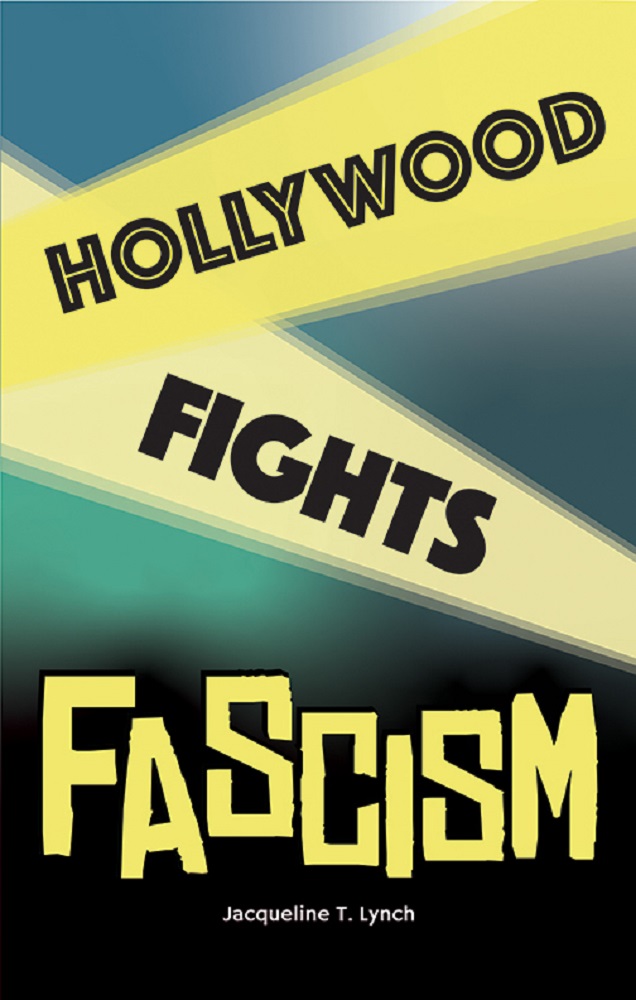Strange Holiday (1945) is a dystopian view on the United States in the closing days of World War II. It’s warning message, belatedly, was for the generation of civilians that fought the war on the home front to keep them pitching in, doing their part, and remembering why doing their part was so important. Soon to be a museum piece in the post-war era when victory brought both relief and amnesia, the movie ironically has more punch to it today. It is a message for our time.
I’d like to note that
this movie first came to my attention back in May when I posted a request from
someone wanting to know the name of a move he recalled from childhood. I had no clue, based on his description, but a
reader came up with this movie, and I think it might have been the one in
question. Many thanks to readers of this
blog for always providing such a wonderful wealth of information. I learn a lot from you. The movie is currently up on YouTube.

Claude Rains stars
as a businessman on a fishing trip in the wilds of “the north woods” with his
buddy, played by Milton Kibbee. Since the movie is sandwiched in this period of
Rains’ career between Mr. Skeffington (1945) and Notorious (1946)
and Deception (1946), which we discussed here, it’s a little surprising
to see this magnificent actor in his prime appearing in such a low-key, and
low-budget-looking film (it runs just over an hour). It’s difficult to surmise whether this is
just an example of Rains’ fulfilling his studio contract and getting off the
bench when he was called, or if this movie was intended to create a bigger
splash but the production never lived up to its greater possibilities.

Rains is a family
man. His wife is played by Gloria
Holden, and his three young children are Bob (Bobbie) Stebbins, Paul Hilton,
and Barbara Bate. It was little Barbara’s only film; the boys both had minor
careers in a handful of movies, but Paul actually started in the Our Gang
shorts in the 1930s.
Rains’ marriage is
a happy one, and he is a doting father.
The movie begins when he realizes he must return home from his vacation immediately
because it is his wedding anniversary. We
have a flashback to his life at home, his kids celebrating Christmas, enduring
school assemblies. It is a quiet and
contented life, but even through these prosaic early scenes we are jabbed with a
sense of foreboding by his voiceover questioning, “How did it happen? When did it happen?”
The director is
Arch Oboler, from his screenplay based on his radio play. His name may be more familiar to fans of old
time radio for his work as a producer/writer/director, a creator of many thoughtful,
inventive radio stories that were powerful in that medium. Here, the emotional and psychological meandering
seems somehow diluted as we must wait a rather long time to find out exactly not
just how or when, but “what” happened.
Mr. Rains and Mr.
Kibbee have taken their trip to get away from the tiring war news. Rains is sick of it and wants a break. They have been gone from home for a few weeks.
They have been cut off from any news. They
are in such a remote area that it was only accessible to them by plane. Kibbee flies the small plane that is owned
jointly by several of their buddies.
The plane has some
engine trouble and they land in a field, where they approach a farmhouse to use
the phone. The farmer acts as if he is suspicious of them, shuts the door and
tells them to go away. The buddies are
baffled and miffed, but shrugging it off, they begin to hitchhike down a
highway. A truck comes along and they stop the driver. He is also standoffish, rude, but he will
take one of them back to town for $20.
Kibbee stays with the plane, Claude Rains goes with the truck driver and
will send help back.
When he reaches
the city where he lives, there is nobody in the streets. He meets a few people he knows, but they shun
him. He goes to a familiar shop to buy an anniversary present for his wife, but
is told, “We can’t sell anything. You know that.”
He knows nothing, but
his unthinking, exuberant nature seems to keep Rains from questioning any of
this too deeply. At this point in the
film, we have more questions than he does, and the sense of fear comes to him
rather late in the game.
He meets someone
from work and is told, “You can’t ask questions.” There is no one in the office. There is no one at home. Everyone is fearful and more than a little
impatient with him for behaving as if he doesn’t understand what’s
happening. He gets on their nerves as
much as they get on his.
Two plainclothes
detectives grab him and hit him with a blackjack. He wakes up in jail. A slow-talking
older man is his cellmate, who kindly brings him water and tries to revive him.
He is played by Thaddeus Jones. He had a
long acting career, but not many movies and most roles were servants, porters,
or waiters. He quiet gentleness is
appealing, and unlike all the other frightened citizens, displays humanity
despite his obvious helplessness. He
tries to tell Rains what’s been happening to society while Rains was on vacay,
but it is difficult to comprehend, let alone to explain it. The best he can do is, “They threw out the
Bill of Rights.”

Claude Rains doesn’t
believe him, and shouts for a lawyer.
Though all the authority figures up to this time have been Americans,
the local man in charge, called the examiner, is a man with a slight German
accent, played by Martin Kosleck. Kosleck had a long career in film and TV, with his earlier movies casting him mostly as terrifying Nazis. He interrogates
Rains, wants to know all about his vacation, where did he go. They bring in Rains’ wife, who is crying, and
then take her immediately away. They
knock Rains unconscious again and he wakes tied to a table, where the examiner
will beat him with a rubber hose. We see
Rains’ bound hand flinching, and then it does not move.
He is interrogated
again and is told, “Discipline, the first rule you must learn in this new state
of ours…This glorious new state that we are planting here. The fulfillment of
the dreams some of us have had since the day we heard a voice telling us of our
destiny.”
Though there are
few displays of fascist regalia, it is inferred that this new order came from
outside our country, but that we were not so much invaded as displaced by
people educated by a foreign fascist doctrine planted here.
The words were
likely less chilling to audiences then, when the war was nearly won, than they
are today. “We will turn your own
democratic weakness against you.” Marches,
labor unions, all our freedoms will be wiped away.
In a haze in
between beatings, Claude Rains reviews in his tangled mind what has happened. He dreams of an idyllic scene of his family
and friends having a picnic in the country, where a young couple discuss their
future. “We were too young for the war
and we’ll be much too old for the next one…We can have anything and everything
we want…” Are the young always so callow
and self-centered, so unable to see trouble ahead? Rains, back in his cell ponders with greater
regret of those lost in the war, “They died on the battlefield that I might
live, and out of their victory, I made nothing.”
Through nightmarish
whispers, he confesses, “I’m not afraid to die.
I’m afraid to go on living.”
“I thought that
freedom was like the air, always with me as long as I lived. I thought you didn’t have to do anything
about it.”
He resolves in his
cell to keep on fighting. However, and
somewhat disappointingly (because a Resistance-style pushback would have added
some satisfying action), it was all a dream.
He wakes in the fishing camp in the north woods and is eager to rush
home to his wife and kids.
“It was only a
dream” is probably the biggest deflator in any movie plot.
A lot more might
have been made of this movie, which feels like it was padded a bit to fill out what might have been a more taut radio script.
The most chilling aspects are the loss of the Bill of Rights and the way
his frightened community has caved. And
his confession that he is afraid to go on living.
We are on the
brink of such a scenario today. Russian election sabotage mixed with white
supremacist street gangs playing soldier with AR-15 weapons, rampant police brutality, along with a Republican
Party that has caved in to the Trump Party, all gleefully and greedily conspiring
to destroy American democracy, and during a raging pandemic to boot. It would be a good time to wake up.
*********************
Jacqueline T. Lynch is the author of Ann Blyth: Actress. Singer. Star. and Memories in Our Time - Hollywood Mirrors and Mimics the Twentieth Century. Her newspaper column on classic films, Silver Screen, Golden Memories is syndicated nationally. Her next book, a collection of posts from this blog - Hollywood Fights Fascism - will be out next month.



























